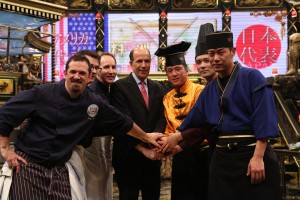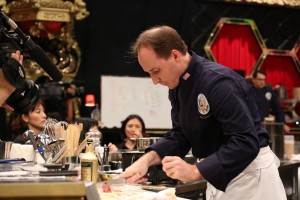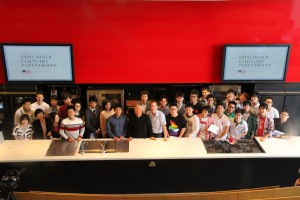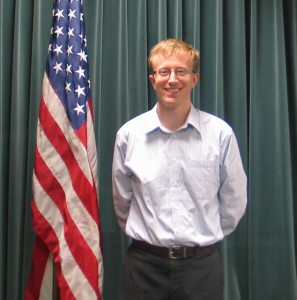
On June 27, three chefs from the American Chef Corps arrived at Fuji TV’s Wangan Studios in Odaiba to represent their country on one of the most famous cooking shows in the world: Iron Chef. They participated in the inaugural Culinary World Cup match in which Team USA challenged Team Japan in four rounds of competition with a panel of five international judges that included U.S. Ambassador to Japan John V. Roos. The secret ingredient chosen was beef, including various cuts of American and Japanese beef so as to not disadvantage either team.
As an intern at the U.S. Embassy in Tokyo, I had an opportunity to participate in the filming of Iron Chef as a member of the studio audience. Watching the matches from a high vantage point, I had a commanding view of Team USA’s kitchen area and could see everything that occurred throughout each round.

One of the biggest changes from previous editions of Iron Chef was the absence of any cooking assistants. This really made each match a test of skills between the two chefs and allowed them to show their true cooking ability by handling every aspect of the meal individually. When Chef Eric Ziebold, the leader of Team USA, accidentally burned his hand after touching two scalding pans, it added an element of drama to the show, keeping us on the edge of our seats. The U.S. jumped out to a 2-1 lead going into the final round, but the presentation, creativity, and taste of Japan’s final dish – an exquisite arrangement of sushi prepared from a piece of beef roasted underneath a mountain of salt shaped like Mt. Fuji – thoroughly impressed the judges and secured victory for Team Japan. Although Team Japan won the match, Team USA performed extremely well throughout the competition, and Ziebold expressed his pride by saying, “We represented the United States very admirably.”
The American Chef Corps is a group of prominent chefs who promote American cuisine through a wide variety of domestic and international activities. The group was formed by the Diplomatic Culinary Partnership, an organization founded in September 2012 by the Department of State and James Beard Foundation. The partnership seeks to use American food, culture, and history to enhance conversations on nutrition, agriculture, sustainability, and entrepreneurship while also expanding awareness about modern American cuisine.
The day after the Iron Chef filming, Chef Eric Ziebold visited Hattori Nutrition College in Shibuya to give a talk to 100 students on the development and current trends of food in the United States. He was able to make a substantial impact on the students through his comprehensive introduction to the history of American food culture, mouth-watering examples of modern American cuisine from his restaurant CityZen, and articulate description of American food traditions and how they differ from Japanese food traditions. The culinary students were captivated by the speech and inspired by Ziebold’s advice: “Always cook something you feel connected to. Be passionate about what you cook, even if people do not know what you are cooking or what you want to do because eventually the world will catch up with you and accept it.”

After the event, I had a chance to talk to some of the Japanese students about their impressions of Ziebold’s presentation. “I thought that American food mainly consisted of fast food,” said Rouma Shima. “After hearing Chef Ziebold’s speech, I have learned that it has tradition and is constantly evolving. As a result, I’m now considering studying culinary arts in the U.S. in addition to Italy and France.” Out of the ten interviews that I did myself or observed, eight students explicitly mentioned that their view of American food culture had previously been limited to hamburgers and junk food, and that this talk opened their eyes to the development of an authentic American food culture.
The American Chef Corps members came to Japan for the purpose of expanding awareness and improving the image of American cuisine, while at the same time enhancing bilateral relations with Japan through people-to-people exchanges. The speaking engagement at the Hattori Nutrition College gave aspiring young chefs an opportunity to meet a renowned American chef in person and the Iron Chef event brought American cuisine and culture into the living rooms of millions of Japanese people. Food is a topic that almost everybody has something to say about, especially in Japan and the U.S. on account of the abundance of delicious local ingredients and cooking styles to choose from. “I think it was great because we were doing something that comes naturally to all of us, eating,” said Ziebold, speaking on a visit to the Chinese Iron Chef Yuji Wakiya’s restaurant after the Iron Chef filming. “If you think about it, what better environment, and I think this is the point of diplomacy through cuisine, what better environment to do that in than when you’re nourishing yourself around a table?”
______________________________________________________________________________________________________
 Matthew Wright was the Press Office 2013 summer intern at the U.S. Embassy in Tokyo. He is a second-year graduate student at Vanderbilt University where he will earn his Master of Education in Higher Education Administration. He graduated from Cornell University in 2009 with degrees in Government and Asian Studies and proceeded to teach English in Wakayama Prefecture for three years on the Japan Exchange & Teaching (JET) program.
Matthew Wright was the Press Office 2013 summer intern at the U.S. Embassy in Tokyo. He is a second-year graduate student at Vanderbilt University where he will earn his Master of Education in Higher Education Administration. He graduated from Cornell University in 2009 with degrees in Government and Asian Studies and proceeded to teach English in Wakayama Prefecture for three years on the Japan Exchange & Teaching (JET) program.







COMMENTS1
Cooking Competition is always exciting, though it does have the unfortunate that we can’t eat the meal people created, really that the worst part, what do you think?
LEAVE A COMMENT
TOP